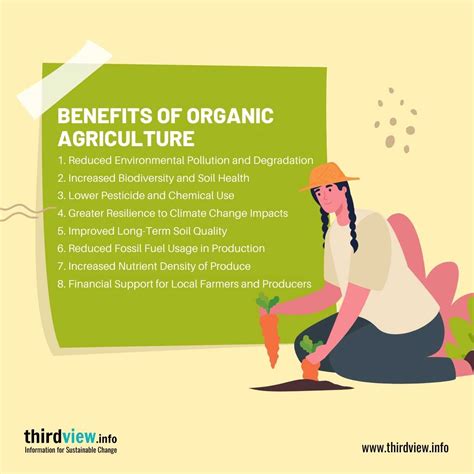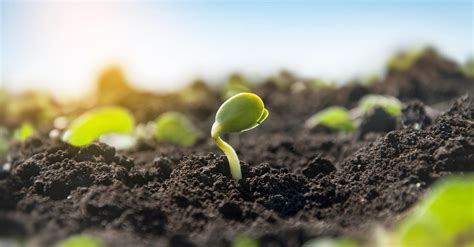With the escalating concern over the state of our natural environment, there is an urgent need to adopt agricultural practices that promote sustainability. The current agricultural paradigm requires effective solutions that prioritize the long-term welfare of our ecosystem. In this regard, organic farming emerges as a crucial driver towards environmental preservation, offering a holistic approach to sustainable agriculture.
Organic farming involves the cultivation of crops and rearing of livestock without the use of synthetic fertilizers, pesticides, or genetically modified organisms. This alternative agricultural system is based on age-old farming techniques that prioritize the utilization of natural resources and ecological harmony. By harnessing the power of nature, organic farming represents a philosophy that respects the intricate web of life, ensuring the conservation of biodiversity and the preservation of soil fertility.
By adopting organic farming practices, farmers mitigate the negative impacts associated with conventional agriculture, such as chemical runoff, soil degradation, and groundwater pollution. The absence of synthetic inputs safeguards the health of agricultural workers, consumers, and the surrounding communities. Moreover, organic farming enhances the sustainability of agricultural systems by reducing greenhouse gas emissions and promoting carbon sequestration, helping to mitigate the effects of climate change.
The Advantages of Organic Cultivation in Promoting Ecological Balance

When considering the significance of organic agriculture in maintaining the harmony of our natural world, numerous advantageous aspects become apparent. Organic farming practices not only offer a range of environmental benefits but also contribute to the overall sustainability of our planet.
One of the primary merits of organic cultivation lies in its ability to protect biodiversity. By avoiding the use of synthetic chemicals, organic farmers create a favorable environment for various species of flora and fauna to thrive. This promotes the preservation and restoration of natural habitats, supporting the ecological balance essential for the long-term well-being of our ecosystems.
Furthermore, organic farming practices also play a crucial role in preserving soil health. Organic farmers employ techniques such as crop rotation, composting, and the use of natural fertilizers to enhance soil fertility. This not only improves plant growth but also prevents soil erosion and degradation, ensuring the longevity and productivity of agricultural lands.
A significant advantage of organic agriculture is the reduction of water pollution. By refraining from using chemical pesticides and synthetic fertilizers, organic farmers minimize the risk of these harmful substances seeping into streams, rivers, and groundwater. This not only protects aquatic life but also safeguards the quality of our water resources, benefiting both human and animal populations.
In addition to promoting ecological balance, organic cultivation also contributes to combating climate change. Organic farms typically adopt practices that promote carbon sequestration, such as the use of cover crops and minimal soil disturbance. These methods help to reduce the release of greenhouse gases into the atmosphere, mitigating climate change effects and promoting a more sustainable future.
In conclusion, organic farming offers a multitude of advantages when it comes to environmental sustainability. From protecting biodiversity and enhancing soil health to reducing water pollution and combating climate change, the implementation of organic cultivation practices is paramount in maintaining the delicate balance of our natural world for generations to come.
Reducing Chemical Pollution
In the pursuit of preserving the ecological harmony and safeguarding our surroundings, it is imperative to address the issue of reducing chemical pollution in agriculture. Chemical pollution, resulting from the excessive use of synthetic substances in farming practices, poses a significant threat to the environment and all its intricate ecosystems.
By minimizing the usage of harmful chemicals, we can mitigate the detrimental impact on soil, water, and biodiversity. Adopting alternative farming methods that focus on organic and natural approaches enables us to safeguard the delicate balance of nature and reduce the reliance on synthetic inputs that harm both the environment and human health.
Emphasizing the significance of eco-friendly techniques like crop rotation, biological pest control, and composting can bring about a positive shift towards sustainable farming. These practices promote soil fertility, entice beneficial insects, and enhance nutrient cycling, which collectively contribute to a healthier and more resilient ecosystem. Utilizing organic fertilizers and natural pesticides can further help in maintaining a chemical-free environment.
Furthermore, spreading awareness about the negative consequences of chemical pollution in agriculture is crucial. Encouraging farmers, consumers, and policymakers to embrace organic farming practices can trigger a paradigm shift in the way we approach food production. This shift would not only promote environmental sustainability but also safeguard our own well-being by minimizing exposure to toxic substances.
In conclusion, addressing the issue of chemical pollution in agriculture is paramount for the preservation of our environment and the overall well-being of all living organisms. By transitioning to organic farming methods and spreading awareness, we can pave the way for a more sustainable future where nature thrives and chemical pollutants cease to threaten our planet's delicate equilibrium.
Enhancing Soil Health

In this section, we will explore the significance of promoting the well-being of the soil in the context of sustainable agriculture and ecological balance. Acknowledging the fundamental role of soil as a living and dynamic ecosystem is crucial for understanding the importance of its health in our quest for a more sustainable future.
Building Soil Fertility:
One of the key aspects of enhancing soil health is the promotion of soil fertility. By implementing organic farming practices, we can ensure the enrichment of soil with essential nutrients and organic matter. This nourishment is vital for the growth and development of plants, fostering a sustainable ecosystem that supports various organisms, from microorganisms to insects, birds, and mammals.
Increase Soil Resilience:
Another crucial objective of enhancing soil health is to increase its resilience. Organic farming methods, such as crop rotation, cover cropping, and minimal tillage, help build a robust soil structure. This improved structure enables better water retention, reduces erosion, and enhances soil's ability to withstand adverse conditions like droughts or heavy rainfall.
Promoting Biodiversity:
Enhancing soil health plays a significant role in supporting biodiversity. Healthy soil provides a diverse habitat for a wide range of organisms, contributing to the overall ecological balance. Organic farming practices, with their emphasis on natural pest and weed management, create a harmonious environment where beneficial insects and microbes thrive, reducing the need for chemical interventions.
Carbon Sequestration:
Organic farming is also instrumental in combating climate change by promoting carbon sequestration in soils. By utilizing practices like composting, cover cropping, and agroforestry, organic farmers enhance the capacity of soil to store carbon. This process helps mitigate the release of greenhouse gases into the atmosphere, contributing to climate stability and reducing the environmental impact of agriculture.
In conclusion, prioritizing the enhancement of soil health is a crucial component of organic farming practices. By focusing on building soil fertility, increasing resilience, promoting biodiversity, and facilitating carbon sequestration, we can contribute to the long-term sustainability of our environment and achieve a more balanced and resilient agricultural system.
Water Conservation Strategies for Ensuring Sustainable Agriculture
Water, a crucial resource for agricultural production, demands the adoption of effective conservation strategies to ensure sustainable and environmentally-friendly farming practices. By conserving water resources, farmers can minimize water wastage, promote ecosystem preservation, and enhance the overall efficiency of their operations.
FAQ
What is organic farming and how does it contribute to environmental sustainability?
Organic farming is a method of agricultural production that relies on natural processes and materials to cultivate crops and raise livestock. It emphasizes the use of organic fertilizers, crop rotation, biological pest control, and the exclusion of synthetic chemicals and genetically modified organisms. Organic farming contributes to environmental sustainability by reducing soil erosion, preserving biodiversity, improving water quality, and minimizing the release of greenhouse gases.
How does organic farming impact soil health?
Organic farming practices, such as the use of compost and organic matter, enhance soil fertility and structure, leading to improved soil health. By promoting beneficial soil microorganisms, organic farming helps in nutrient cycling, increases soil organic carbon content, and enhances water-holding capacity. This protects soil from degradation, erosion, and loss of essential nutrients, which ultimately contributes to long-term soil sustainability.
Does organic farming reduce the use of synthetic chemicals?
Yes, organic farming significantly reduces the use of synthetic chemicals, including pesticides and fertilizers. Instead, it relies on natural methods like crop rotation, biological pest control, and the use of organic fertilizers, such as compost and manure. This reduces the potential negative impact of synthetic chemicals on the environment, minimizes water pollution, and helps to preserve biodiversity.
How does organic farming promote biodiversity?
Organic farming promotes biodiversity by creating a more diverse and balanced agroecosystem. It avoids the use of synthetic chemicals that can harm beneficial organisms and relies on natural pest control methods, allowing for the presence of predator insects and birds. Organic farmers also maintain hedgerows, flowering plants, and grasslands, which provide habitats for pollinators and other wildlife. This diversity supports a healthier ecosystem and enhances overall biodiversity.
Does organic farming help in reducing greenhouse gas emissions?
Yes, organic farming plays a role in reducing greenhouse gas emissions. By avoiding the use of synthetic fertilizers, organic farming reduces the release of nitrous oxide, a potent greenhouse gas. Moreover, organic practices, such as cover cropping and crop rotation, enhance soil health and increase carbon sequestration in the soil, helping to mitigate climate change by reducing carbon dioxide levels in the atmosphere.



